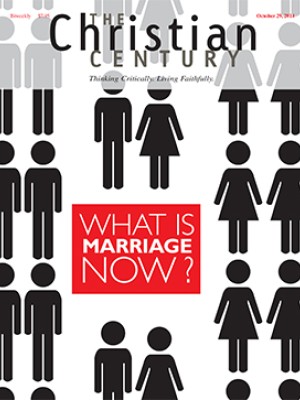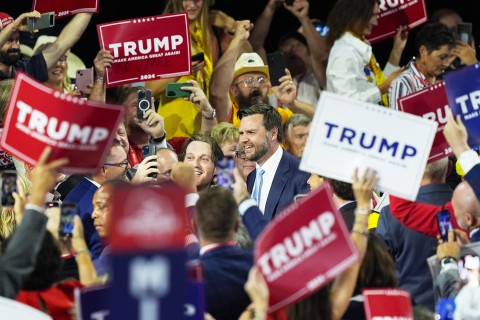Muslim scholars challenge ‘Islamic State’ in open letter
More than 120 Muslim scholars from around the world endorsed an open letter to the “fighters and followers” of the so-called Islamic State, denouncing them as un-Islamic in the most Islamic of terms.
Relying heavily on the Qur’an, the 18-page letter released in late September picks apart the extremist ideology of the militants, whose bid to establish a transnational Islamic state in Iraq and Syria has left a wake of brutal death and destruction.
Even translated into English, the letter will still sound strange to most Americans, said Nihad Awad, executive director of the Council on American-Islamic Relations, who released it in Washington with ten other American Muslim religious and civil rights leaders.
Read our latest issue or browse back issues.
“The letter is written in Arabic,” Awad said. “It is using heavy classical religious texts and classical religious scholars that ISIS has used to mobilize young people to join its forces.”
Even mainstream Muslims, he said, may find it difficult to understand. A translated 24-point summary of the letter includes the following: “It is forbidden in Islam to torture”; “It is forbidden in Islam to attribute evil acts to God”; and “It is forbidden in Islam to declare people non-Muslims until he (or she) openly declares disbelief.”
Awad said its aim is to offer a comprehensive Islamic refutation, “point by point,” to the philosophy of IS and the violence it has perpetrated. The letter’s authors include well-known religious and scholarly figures in the Muslim world, including Sheikh Shawqi Allam, the grand mufti of Egypt, and Sheikh Muhammad Ahmad Hussein, the mufti of Jerusalem and All Palestine.
This is not the first time Muslim leaders have joined to condemn IS. The chairman of the Central Council of Muslims in Germany, Aiman Mazyek, for example, told the nation’s Muslims that they should speak out against the “terrorists and murderers” who fight for IS and who have dragged Islam “through the mud.”
But the Muslim leaders who endorsed the letter called it an unprecedented refutation of IS ideology from a collaboration of religious scholars. It is addressed to the group’s self-anointed leader, Abu Bakr al-Baghdadi, and “the fighters and followers of the self-declared ‘Islamic State.’”
But the words Islamic State are in quotes, and the Muslim leaders who released the letter asked people to stop using the term, arguing that it plays into the group’s unfounded logic that it is protecting Muslim lands from non-Muslims and is resurrecting the caliphate—a state, governed by a Muslim leader, that once controlled vast swaths of the Middle East.
“Please stop calling them the ‘Islamic State,’ because they are not a state and they are not a religion,” said Ahmed Bedier, a Muslim and the president of United Voices for America, a nonprofit that encourages minority groups to engage in civic life.
Christian and Jewish leaders have also spoken out and say they hope to dissuade youth from joining IS ranks by developing an alternative worldview that counters the group’s religious claims.
“To offer a different worldview endorsed by religions, as well as governments, in the long term will go a long way to defeating its appeal to those who are looking to join them,” said Antonios S. Kireopoulos of the National Council of Churches in the United States, which represents about 45 million Christians.
Archbishop of Canterbury Justin Welby said in a late September speech that if “we struggle against a call to eternal values, however twisted and perverted they may be, without a better story, we will fail in the long term.”
Response to the extremists, he said, must “be undertaken on an ideological and religious basis that sets out a more compelling vision, a greater challenge and a more remarkable hope than that offered by ISIL. We must face the fact that for some young Muslims the attractions of jihadism outweigh the materialism of a consumer society.”
Rabbi David Rosen, the American Jewish Committee’s international director of interreligious affairs, said there are many interreligious efforts to condemn violence done in the name of religion.
“Of course, there is little that religious leaders can do other than exercise whatever moral authority they have,” he said. “In other words, any ‘coalition’ is more for the sake of the good name of religion . . . than any ability to thwart religious extremism, which portrays religious leadership that opposes it as Uncle Toms at best, if not collaborators with the devil.” —Religion News Service; USA Today; added source
This article was edited October 13, 2014.






